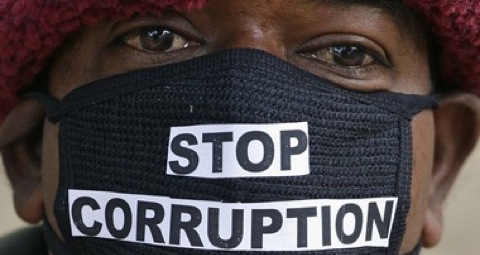Transparency International says the 2020 Corruption Perception Index (CPI) reveals persistent corruption is undermining health care systems and contributing to democratic backsliding amid the Covid-19 pandemic.
In a statement to launch the 2020 CPI, the Chairperson of Transparency International, Delia Ferreira Rubio said, “Covid-19 is not just a health and economic crisis, it is a corruption crisis and one that we are currently failing to manage”.
According to her, countries with higher levels of corruption have performed poorly in addressing the challenges the pandemic poses to their health care systems and economies.
“But even those at the top of the CPI must urgently address their role in perpetuating corruption at home and abroad,” she added.
She called on governments to invest more in health care in order to efficiently provide universal health coverage while promoting accountability and transparency in their performance of their duties.
“It is important to note that, eighty per cent (80%) of the countries that significantly have improved their CPI scores since 2012 also have the percentage of their health expenditure to GDP above five per cent (5%)” a statement from the Ghana Integrity Initiative, a local chapter of Transparency International read.
Ghana scored 43 out of a possible clean score of 100 and ranked 75 out of 180 countries/territories included in this year’s index.
This CPI score indicates that Ghana gained 2 points compared to its 2019 score of 41. Ghana’s score also exceeds the Sub-Saharan African (SSA) average score of 32 and is equal to the global average score of 43.
Ghana’s score of 43 placed her 10th in SSA.
Seychelles is ranked highest with 66 points followed by Botswana with 60, Cabo Verde with 58, Rwanda with 54 and Mauritius scored 53 as the top five countries in SSA.
Ghana also performed better than 39 other SSA countries including Benin, Lesotho, Burkina Faso, and Ethiopia, etc.
According to the report from the Ghana Integrity Initiative, the nine Sub-Saharan African countries that performed better than Ghana in the 2020 CPI spend higher on health (between 9.5 - 4.0 percent of GDP) as compared to Ghana’s 3.9 percent of GDP.
They said despite Ghana’s commendable Covid-19 prevention measures, issues of accountability remain outstanding.
The GII have thus recommended that government among other things, strengthen oversight institutions to ensure resources reach those most in need.
“Anti-corruption authorities and oversight institutions must have sufficient funds, resources, and independence to perform their duties in real time to identify and prevent diversion of government support.”
Also, government must enforce procurement rules to all contracts while ensuring open and transparent contracting to combat wrongdoing.
“Government must stay within the Public Procurement (Amendment) Act 663 while preventing the abuse of single-source procurement during emergencies like Covid-19.”
Latest Stories
-
Hearts of Oak withdraw from pre-season competition in Lagos
29 seconds -
Scholarships Authority Bill goes before Parliament, targets eliminating cronyism and nepotism
9 minutes -
Engineers & Planners defends $100m Azumah gold mine acquisition, dismisses political claims
11 minutes -
Why Ghanaian music struggles to get paid and played
13 minutes -
FIFA Club World Cup: Miami’s defense comes undone against high-flying PSG side
14 minutes -
LIST: Nana Ansah Kwao IV among 8 appointed to new board of Ghana Infrastructure Investment Fund
28 minutes -
Full text: Engineers & Planners responds to $100m Azumah Resources gold mine deal
41 minutes -
JoySports Invitational: Sapholda Ventures CEO calls on corporate Ghana to patronize event
42 minutes -
Ghana’s 24-Hour Economy policy: Energy demand, supply, and investment requirements
46 minutes -
Suspended CJ sues Ghana at ECOWAS Court over alleged Human Rights abuse
48 minutes -
Professionalism crucial in curbing negative stereotypes about female musicians – Debby Sway
1 hour -
U.S. donates radiation detection equipment to support Ghana’s nuclear safeguards
1 hour -
Ghana’s electricity demand to rise to 4.7% in 2025 — Energy Outlook report
1 hour -
Joy FM’s Edem Knight-Tay joins UMB as Head of Corporate Communication
1 hour -
GF Awards 2025: Nasco Ghana honours winners with premium gifts at exclusive presentations
2 hours

